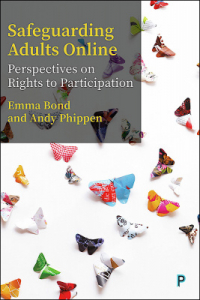Having worked for nearly 40 years collectively in the online safeguarding arena, we have seen many changes in the discourses on online risk but also much repetition and a familiarity in the same dominant perspectives.
While the concept of online safeguarding for children and young people is well explored from both research and policy perspectives, and there are many statutory requirements imposed on stakeholders to ensure effective training and education in this arena, the same cannot be said when it comes to adults with learning difficulties and mental capacity issues, and those supporting them. We have sought throughout our careers to challenge much of the bias which underlies the dominance of protectionism towards a more rights-based tactic and to emphasise the importance of adopting an evidence-based approach to online safeguarding, rather than one based on opinion or personal values.
The shift towards independent supported community living for adults with a learning disability or mental capacity issue is to be celebrated, but this societal change needs to be adequately underpinned by holistic and individualised approaches to supporting all aspects of community living, including online access.
The Online Safety Bill, the piece of legislation that will, we are told, make the UK the ‘safest place to go online in the world’, makes no mention whatsoever of vulnerable adults. There is a dearth of academic research, policy direction and practice guidance related to the difficulties of ensuring that adults with a learning disability or mental capacity issue are supported in their access to online environments. This has left those with safeguarding responsibilities for ‘vulnerable adults’ to have to make poorly informed judgements on their capacity to engage with online services, and in a state of confusion about to how best to help them.
The rulings by Cobb J in the Court of Protection cases re A and re B in 2019 starkly revealed the complexity of the cases faced by professionals. However, Cobb drew on previous child online safeguarding perspectives to develop his guidance. The appropriateness of applying child protectionist perspectives to adults with a learning disability or mental capacity issue is far from straightforward. The guidance in which he defined a list of six tests – for determining whether adults are capable of understanding safeguarding issues when online –sets the bar for assessing capacity extremely high. Many adults without capacity issues would not in reality be able to demonstrate capacity assessment if subjected to the six tests advocated in the ruling. As a result, current practice across sectors working with those with capacity issues is using safeguarding arguments as an excuse for excessive monitoring and control, denying many individuals their rights to freedom of expression, privacy and access to information, and thereby undermining their human rights (including the UN Convention of the Rights of Persons with Disabilities).
These deterministic trappings of cybertopian or cybersceptic discourses mirror the outdated, prohibitive approaches in online child protection discourses we witnessed decades ago, and fail to acknowledge the complexity of self-identity, inclusion, intimacy and sexuality as fundamental human rights. Rather than denying people access under the guise of ‘protection’ and depriving them of their liberty, we should place online participation at the forefront of guidance and training for those professionals making assessments.
People’s rights to online participation and privacy should be respected and supported rather than denied, and decisions should be taken based on the individual, not a broad concept of vulnerability or categorisation of risk as a result of disability.
Emma Bond is Pro Vice Chancellor Research and Professor of Socio-Technical Research at the University of Suffolk. Andy Phippen is Professor of Digital Rights at Bournemouth University.
 Safeguarding Adults Online: Perspectives on Rights to Participation by Emma Bond and Andy Phippen is available on the Bristol University Press website. Order here for £18.06.
Safeguarding Adults Online: Perspectives on Rights to Participation by Emma Bond and Andy Phippen is available on the Bristol University Press website. Order here for £18.06.
Bristol University Press/Policy Press newsletter subscribers receive a 25% discount – sign up here.
Follow Transforming Society so we can let you know when new articles publish.
The views and opinions expressed on this blog site are solely those of the original blog post authors and other contributors. These views and opinions do not necessarily represent those of the Policy Press and/or any/all contributors to this site.
Image credit: S. Hermann & F. Richter from Pixabay


